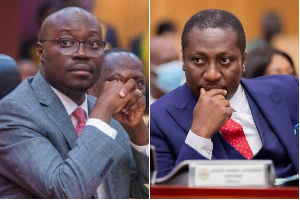The immediate past Dean of the University of Ghana Business School, Prof. Joshua Yindenaba Abor, has suggested that reforms are needed in the global financial architecture in order to achieve sustainable financial growth across Africa and the world.
To this end, he advised that the Bretton Woods institutions—that is, the International Monetary Fund (IMF) and the World Bank—should focus more on their core mandates.
“I believe looking at the Bretton Woods institutions and even the regional development banks, there is the need for them to focus on their core mandates. So IMF needs to focus more on surveillance of the world economy and also ensuring that macroeconomic stability among member countries is attained. The World Bank and regional development banks should concentrate on providing technical assistance in facilitating private capital flows and also serving as lender of last resort to member countries that are affected by crises.”
Prof. Abor said this at the virtual launch of a book, Contemporary Issues in Development Finance, edited by himself and two others, Charles Komla Delali Adjasi and Robert Lensink.
He also questioned the use of IMF conditionality, saying it is often viewed by developing countries as costly and intrusive, adding that, normally during a crisis, reforms tend to frighten private sector participants about the seriousness of the problem.
“Once you try to restructure as a condition for a facility, market players react; they think there are serious problems in the economy and that makes it difficult to restore confidence in the market. You promote moral hazard, so lending institutions and borrowing institutions would engage in acts that lead to moral hazard.”
According to him, the IMF’s conditionality is biased against developing countries, stressing that developed countries do not face the kind of conditionality that is often imposed on developing countries.
“We need to look at reforming the entities themselves,” he said. “Emerging economies, developing countries need to be given the opportunities to contribute resources [to the institutions] as opposed to being net borrowers. If we are seen as net borrowers, then we take whatever is given to us. We should be given greater representation on the board, voting rights, and the appointment process must be open.”
On his part, Prof. Charles Komla Delali Adjasi touched on the impact of foreign banks, indicating that their presence is good, but in terms of risks, regulators need to ensure they do not become too big, which will hurt the indigenous banks.
The book provides a comprehensive and up-to-date coverage of theoretical and policy issues in development finance from both the domestic and external finance perspectives and emphasises addressing gaps in financial markets.
The chapters cover topical issues such as microfinance, private sector financing, aid, FDI, remittances, sovereign wealth, trade finance, and the sectoral financing of agricultural and infrastructural projects.
Business News of Monday, 15 February 2021
Source: thebusiness24.com.gh

















